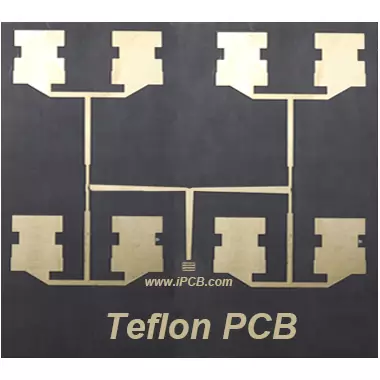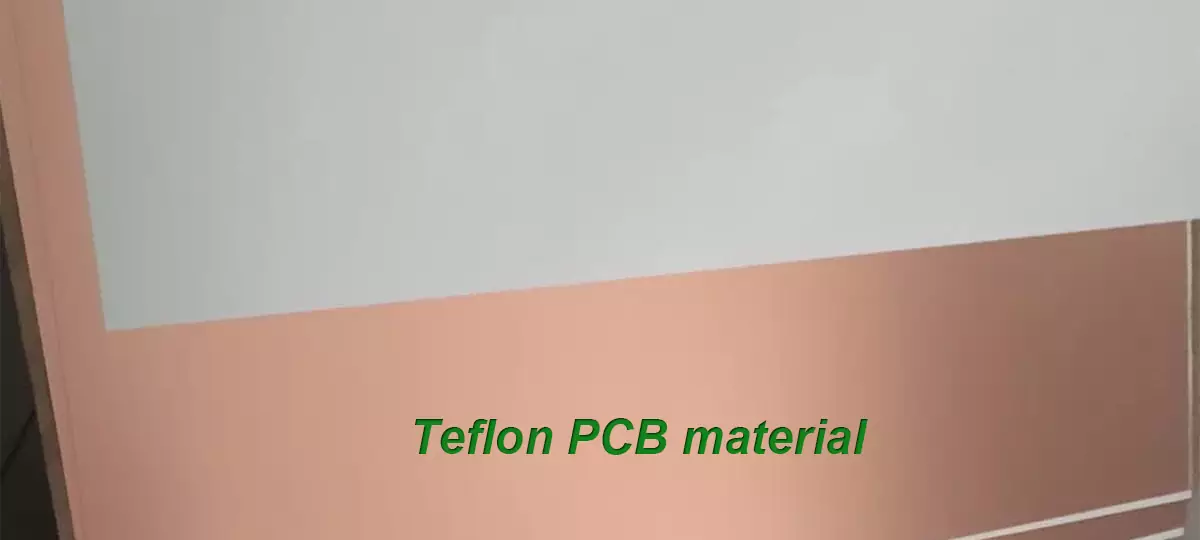
Product Name: Teflon PCB
Dielectric constant (DK): 2.2, 2.55, 2.65, 2.75, 2.85, 2.95, 3.0, 3.3, 3.5
Tangent loss (DF): 0.0030@10GHz
Copper adhesion: 12ibs/inch
Water absorption: ≤ 0.02%
Surface resistance: 1X1016 ohm
Body resistance: 1X1012 ohm
Working temperature: -100 to+150 ℃
Teflon PCB features: low loss, low cost, strong copper foil adhesion
Applications: Mobile communication, power amplifier, low-noise amplifier, antenna
Teflon PCB is also commonly referred to as PTFE PCB or polytetrafluoroethylene PCB. What are the advantages and disadvantages of Teflon PCB circuit board?
Advantages of Teflon PCB
Extremely low dielectric constant: The dielectric constant of Teflon PCB based materials such as RT/duroid 5880 is only 2.2, much lower than the common FR-4 substrate's around 4.5. This extremely low dielectric constant is beneficial for achieving better high-frequency response and higher signal transmission speed.
Ultra low dielectric loss: Teflon PCB has an extremely low dielectric loss tangent value, typically below 0.0009. This means that in high-frequency circuits, signal integrity can be maximally maintained, signal loss can be reduced, and system performance can be improved.
Excellent dimensional stability: Teflon PCB has a very low coefficient of thermal expansion, which ensures good dimensional stability of the circuit board under temperature changes, which is beneficial for the reliability and consistency of high-frequency circuits.
Excellent thermal conductivity: Compared to FR-4, Teflon PCB has better thermal conductivity, which is beneficial for heat dissipation of high-power circuits, improving circuit reliability and service life.
Good flexibility: Teflon PCB has a certain degree of flexibility, which can reduce the impact of stress on the circuit board to a certain extent and improve its bending resistance.
Disadvantages of Teflon PCB
Cold flowability: Teflon material has a certain degree of cold flowability, which may cause slight changes in the shape and size of the material in certain applications.
High difficulty in PCB manufacturing: Due to the special properties of Teflon PCB, such as high lubricity and non adhesiveness, its processing difficulty is relatively high. During the PCB wiring and drilling process, issues such as air gouging or tearing are prone to occur.
High cost: Compared to traditional FR-4 materials, the cost of Teflon PCB is significantly higher. This is mainly due to its special production process and material costs.
Application of Teflon
Teflon is widely used in industries such as atomic energy, aerospace, electronics, electrical, chemical, machinery, instruments, meters, construction, textiles, food, etc. It is widely used as a high and low temperature resistant, corrosion-resistant material, insulation material, and anti stick coating.
Teflon high-frequency PCB is widely used in high-frequency high-performance circuit fields such as radar, satellite communication, 5G base stations, etc. due to their excellent dielectric properties, low losses, dimensional stability, and good thermal conductivity.

Teflon PCB Material
The manufacturing process of PTFE PCB is relatively complex, including material preparation, graphic printing, chemical corrosion, metal addition, soldering and assembly, testing and quality inspection, and other steps. In the manufacturing process of PTFE PCB Circuit Board, special attention should be paid to the high thermal expansion coefficient of PTFE material and its special requirements for chemical treatment.
Teflon PCB can be used in humid environments and maintain stable performance due to its low water absorption rate and good mechanical durability. Teflon has a very low dielectric constant and dielectric loss, and is therefore used in various electronic components including Teflon PCB manufacturing.
Teflon PCB circuit board have significant advantages in high temperature, low temperature, corrosion resistance, insulation, and lubrication, but at the same time, there are also problems such as cold flow, processing difficulty, and high cost.
iPCB specializes in the manufacturing and production of Teflon PCB circuit board, and provides fast sample services. Teflon PCB types include multiple models and sizes, and support customized processing. If you have a need for Teflon PCB sampling, please contact us.
Product Name: Teflon PCB
Dielectric constant (DK): 2.2, 2.55, 2.65, 2.75, 2.85, 2.95, 3.0, 3.3, 3.5
Tangent loss (DF): 0.0030@10GHz
Copper adhesion: 12ibs/inch
Water absorption: ≤ 0.02%
Surface resistance: 1X1016 ohm
Body resistance: 1X1012 ohm
Working temperature: -100 to+150 ℃
Teflon PCB features: low loss, low cost, strong copper foil adhesion
Applications: Mobile communication, power amplifier, low-noise amplifier, antenna
iPCB Circuit provides support for PCB design, PCB technology, and PCBA assembly. You can request technical consultation or quotation for PCB and PCBA here, please contact email: sales@ipcb.com
We will respond very quickly.